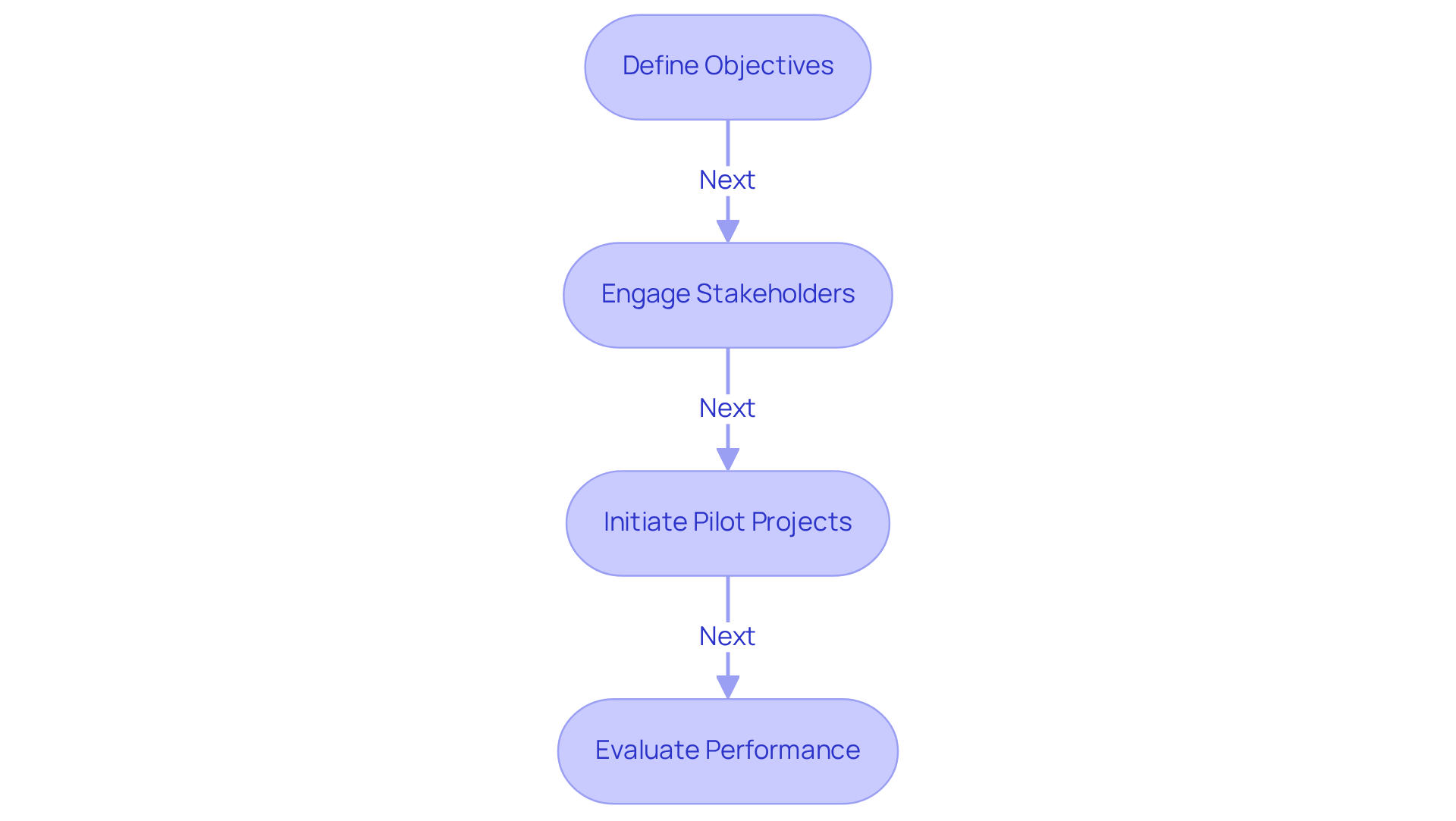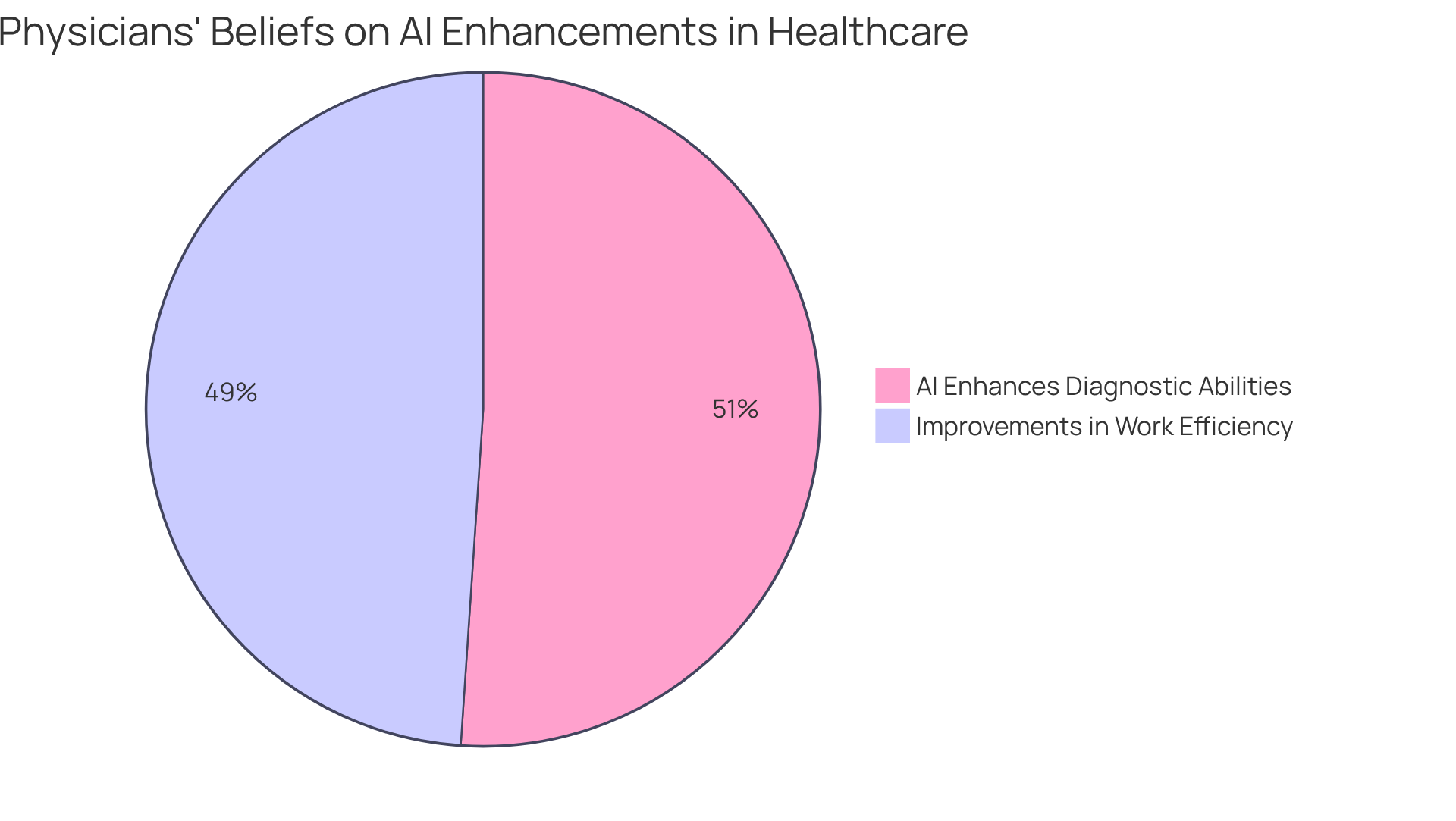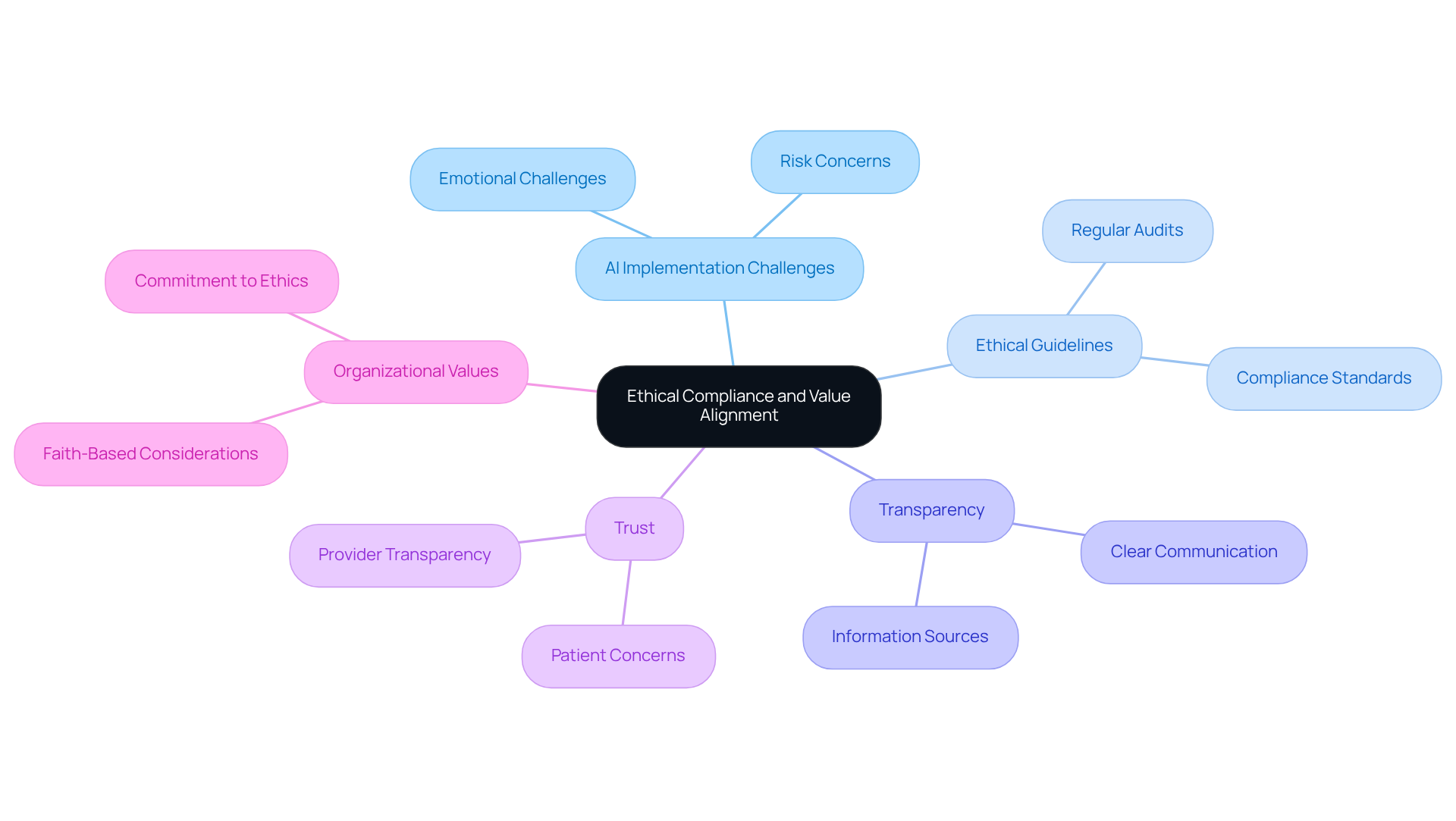Overview
In the demanding world of healthcare, providers often face emotional challenges that can impact their ability to deliver quality care. Administrative burdens can weigh heavily, diverting focus from what truly matters—patient care. To address these concerns, the article outlines four best practices for effectively using medicine AI tools in healthcare:
- Defining objectives
- Engaging stakeholders
- Initiating pilot projects
- Providing ongoing training
These practices are essential for enhancing operational efficiency and improving patient care. When AI is properly integrated and supported, studies show significant improvements in workflow and provider confidence. Imagine a setting where technology alleviates stress rather than adds to it—this is the promise of well-implemented AI solutions.
By embracing these practices, healthcare providers can foster a supportive environment that not only boosts their confidence but also enriches patient experiences. It’s time to take action—let’s explore how we can work together to integrate these tools effectively and compassionately.
Introduction
In the rapidly evolving landscape of healthcare, many providers are feeling the weight of emotional challenges due to overwhelming administrative burdens. This can take a toll not only on their well-being but also on the quality of patient care they strive to deliver. Amidst these struggles, the integration of artificial intelligence (AI) tools emerges as a compassionate ally, offering a promising path to streamline tasks and enhance patient experiences.
This article explores best practices for effectively implementing AI in medicine, highlighting how these tools can transform workflows and reduce burnout. Imagine a scenario where healthcare professionals can focus more on their patients rather than getting lost in paperwork. By embracing AI, we can work towards improving patient outcomes and fostering a more supportive environment for providers.
However, as we navigate this exciting journey of technological adoption, it's crucial for healthcare institutions to remain vigilant about ethical considerations. How can we ensure that we maximize the benefits of AI while addressing the emotional and ethical dimensions of its use? Let’s explore this together.
Understand the Role of AI in Healthcare
In the demanding world of healthcare, the emotional challenges faced by providers are significant. Administrative tasks can weigh heavily, often detracting from the time available for patient care. How can we ease this burden? The medicine AI tool emerges as a compassionate ally, automating these tasks and enhancing diagnostic precision.
Consider the impact of medicine AI tools that analyze individual data to provide insights for medical professionals. A recent study reveals that these technologies can reduce the time spent on administrative duties by up to 69.5%. This remarkable efficiency allows clinicians to devote more time to what truly matters: caring for their patients.
By understanding the capabilities of a medicine AI tool, medical providers can identify specific areas for integration. This not only leads to improved patient outcomes but also fosters . For instance, case studies from organizations that have successfully implemented AI for administrative tasks highlight significant enhancements in workflow. This enables healthcare personnel to focus on delivering quality care, addressing the pressing issue of physician burnout.
Imagine a healthcare environment where providers feel supported and empowered. With AI, this vision can become a reality. Let’s explore how we can embrace these advancements together, enhancing the care we provide and nurturing the well-being of both patients and healthcare professionals.
Adopt Best Practices for AI Integration
Incorporating the medicine AI tool into medical services can be a transformative journey, but it often presents emotional challenges for healthcare providers. To navigate this path effectively, consider these best practices:
- Clearly define objectives for AI use, ensuring they align with your institution's overarching goals.
- Engage stakeholders from various departments to gather diverse insights and foster collaboration.
- Initiate pilot projects to test AI applications in controlled environments before scaling up.
- Continuously evaluate AI performance and adjust strategies based on feedback and outcomes.
For example, a medical organization that implemented AI for patient triage experienced a remarkable 30% reduction in wait times. This success underscores the effectiveness of a structured integration approach, alleviating some of the pressures faced by healthcare teams. Moreover, it's encouraging to note that 65% of U.S. hospitals are currently employing or AI-driven models for predictive analytics. This trend towards data-informed decision-making not only enhances operational efficiency but also supports better patient care. By embracing these practices, we can foster a more compassionate healthcare environment where technology serves to uplift both providers and patients alike.

Provide Training and Support for Healthcare Providers
Training medical providers on the medicine AI tool is essential for fostering a supportive environment in healthcare. Many providers face emotional challenges, feeling overwhelmed by the rapid pace of technological change. By establishing comprehensive training programs that cover both the technical aspects of the medicine AI tool and their practical applications in patient care, organizations can help alleviate these concerns.
Research shows that when medical professionals receive training on the medicine AI tool, their confidence significantly increases. For instance, did you know that:
- 72% of physicians believe AI can enhance their diagnostic abilities?
- 69% report improvements in their work efficiency?
These statistics highlight the transformative potential of the medicine AI tool when providers feel equipped to use it.
Furthermore, ongoing support through workshops and refresher courses is vital. This continuous education ensures that healthcare professionals stay informed about new features and best practices, allowing them to effectively utilize the medicine AI tool in their daily routines. Imagine the impact on patient care when providers are empowered with the right tools and knowledge.
Ultimately, this ongoing education not only enhances outcomes for those receiving care but also . Let’s embrace the journey of integrating AI into healthcare, ensuring that every provider feels supported and confident in their ability to make a difference.

Ensure Ethical Compliance and Value Alignment
Healthcare institutions face emotional challenges as they navigate the implementation of AI technologies. It is essential to prioritize ethical adherence, ensuring these systems are transparent, fair, and respectful of individual privacy. How can we establish ethical guidelines that align with our mission and values, especially in faith-based settings? For instance, CosmaNeura exemplifies this commitment by adhering to Catholic teachings in , ensuring that all recommendations and operations reflect these ethical standards.
Regular audits and assessments of AI systems are crucial for identifying potential biases and ensuring compliance with ethical guidelines. This fosters trust among patients and providers, which is invaluable. Statistics indicate that 86% of Americans express concerns about the lack of transparency in AI-generated medical information. This underscores the necessity for organizations to maintain clear communication about their AI practices.
Furthermore, expert opinions emphasize that transparency and fairness in AI systems are vital for building confidence in these technologies, particularly in sensitive healthcare environments. By addressing these concerns, we can create a more supportive and trustworthy healthcare landscape. Let’s engage in open discussions about our AI practices and work together to enhance the ethical standards in our institutions.

Conclusion
In the ever-changing world of healthcare, the integration of AI tools in medicine shines as a beacon of hope, addressing the challenges faced by providers. By alleviating administrative burdens and improving diagnostic accuracy, these technologies allow healthcare professionals to concentrate on what truly matters: providing exceptional patient care. Embracing AI not only revolutionizes workflows but also cultivates a compassionate environment that prioritizes the well-being of both patients and providers.
This article has highlighted key practices for successfully implementing AI in healthcare. By clearly defining objectives, engaging diverse stakeholders, providing comprehensive training, and ensuring ethical compliance, each step enhances the effectiveness of AI tools. The evidence presented—such as significant reductions in wait times and increased confidence among providers—underscores the profound impact these technologies can have on operational efficiency and patient outcomes.
As the healthcare landscape continues to evolve, it is crucial for institutions to remain committed to ethical standards and transparency in AI practices. By fostering open discussions and prioritizing education, healthcare providers can fully harness the potential of AI while addressing the emotional and ethical dimensions of its use. The journey towards a more efficient and compassionate healthcare system is underway. Let us embrace these advancements to create a brighter future for both patients and professionals alike.




